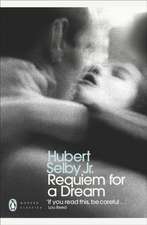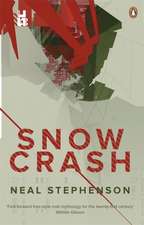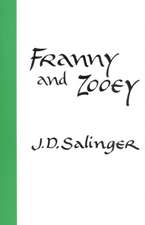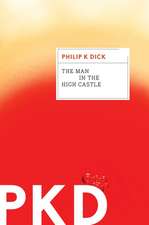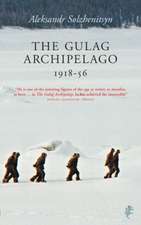The Brothers Karamazov
Autor Fyodor Dostoyevskyen Limba Engleză Paperback – 30 sep 2013
On the surface, the novel grapples with base things; money, rivalry and murder. At a deeper level, it ponders fundamental questions concerning free will and morality, suffering and forgiveness and, finally, the possibility of redemption in a bleak world. Completed shortly before Dostoyevsky's death, The Brothers Karamazov is considered to be his richest novel.
| Toate formatele și edițiile | Preț | Express |
|---|---|---|
| Paperback (17) | 54.00 lei 3-5 săpt. | +15.70 lei 7-13 zile |
| Signet Classics – 30 noi 2007 | 54.00 lei 3-5 săpt. | +15.70 lei 7-13 zile |
| Penguin Books – 26 feb 2003 | 69.21 lei 3-5 săpt. | +29.80 lei 7-13 zile |
| Dover Publications – 31 iul 2005 | 71.80 lei 3-4 săpt. | +32.79 lei 7-13 zile |
| CreateSpace Independent Publishing Platform – | 106.42 lei 3-5 săpt. | |
| Les Prairies Numeriques – 3 aug 2020 | 182.66 lei 3-5 săpt. | |
| – | 193.79 lei 3-5 săpt. | |
| Rupa Publications India Pvt Ltd. – 30 sep 2013 | 213.60 lei 3-5 săpt. | +37.13 lei 7-13 zile |
| CreateSpace Independent Publishing Platform – | 164.96 lei 6-8 săpt. | |
| Digireads.com – apr 2019 | 188.84 lei 6-8 săpt. | |
| SMK Books – 21 mar 2012 | 210.24 lei 6-8 săpt. | |
| Bottom of the Hill Publishing – 30 sep 2014 | 217.26 lei 6-8 săpt. | |
| SC Active Business Development SRL – 29 noi 2017 | 257.20 lei 38-44 zile | |
| Echo Library – 25 feb 2019 | 288.77 lei 38-44 zile | |
| CreateSpace Independent Publishing Platform – | 318.22 lei 6-8 săpt. | |
| Alpha Editions – 13 aug 2020 | 331.20 lei 6-8 săpt. | |
| Simon & Brown – 28 oct 2018 | 353.59 lei 38-44 zile | |
| Simon & Brown – 14 noi 2018 | 387.24 lei 38-44 zile | |
| Hardback (7) | 167.53 lei 3-5 săpt. | +40.85 lei 7-13 zile |
| Penguin Books – 4 ian 2024 | 167.53 lei 3-5 săpt. | +40.85 lei 7-13 zile |
| Prince Classics – 18 mai 2019 | 290.31 lei 38-44 zile | |
| Throne Classics – 11 iun 2019 | 290.31 lei 38-44 zile | |
| SMK Books – 3 apr 2018 | 305.95 lei 6-8 săpt. | |
| Alpha Editions – 13 aug 2020 | 391.82 lei 6-8 săpt. | |
| Simon & Brown – 27 oct 2018 | 407.46 lei 38-44 zile | |
| Simon & Brown – 14 noi 2018 | 430.79 lei 38-44 zile |
Preț: 213.60 lei
Nou
40.87€ • 42.79$ • 33.82£
Carte disponibilă
Livrare economică 15-29 martie
Livrare express 01-07 martie pentru 47.12 lei
Specificații
ISBN-10: 8129129485
Pagini: 826
Dimensiuni: 129 x 198 x 48 mm
Greutate: 0.97 kg
Editura: Rupa Publications India Pvt Ltd.
Notă biografică
Descriere
'The most magnificent novel ever written' Sigmund Freud
The murder of brutal landowner Fyodor Karamazov changes the lives of his sons irrevocably: Mitya, the sensualist, whose bitter rivalry with his father immediately places him under suspicion for parricide; Ivan, the intellectual, driven to breakdown; the spiritual Alyosha, who tries to heal the family's rifts; and the shadowy figure of their bastard half-brother, Smerdyakov. Dostoyevsky's dark masterwork evokes a world where the lines between innocence and corruption, good and evil, blur, and everyone's faith in humanity is tested.
Translated with an Introduction and notes by DAVID McDUFF
Cuprins
The Brothers Karamazov
Notes
Textul de pe ultima copertă
Part mystery, part profound philosophical and theological debate, The Brothers Karamazov pulls the reader in on many different levels. As the Introduction says, "The characters Dostoyevsky writes about, though they may not appear to be ones who live on our street, or even on any street, seem, in their passions and lack of self-control, the familiar and intimate denizens of our souls." It's no wonder that for many people The Brothers Karamazov is one of the greatest novels ever written.
Dover (2005) unabridged publication of the Constance Garnett translation as published by W. Heinemann, London, 1912-1920."







